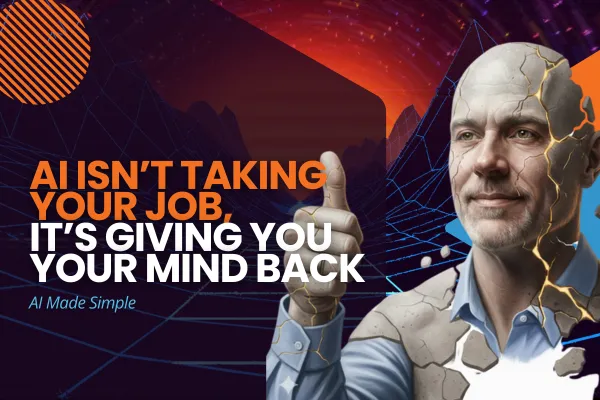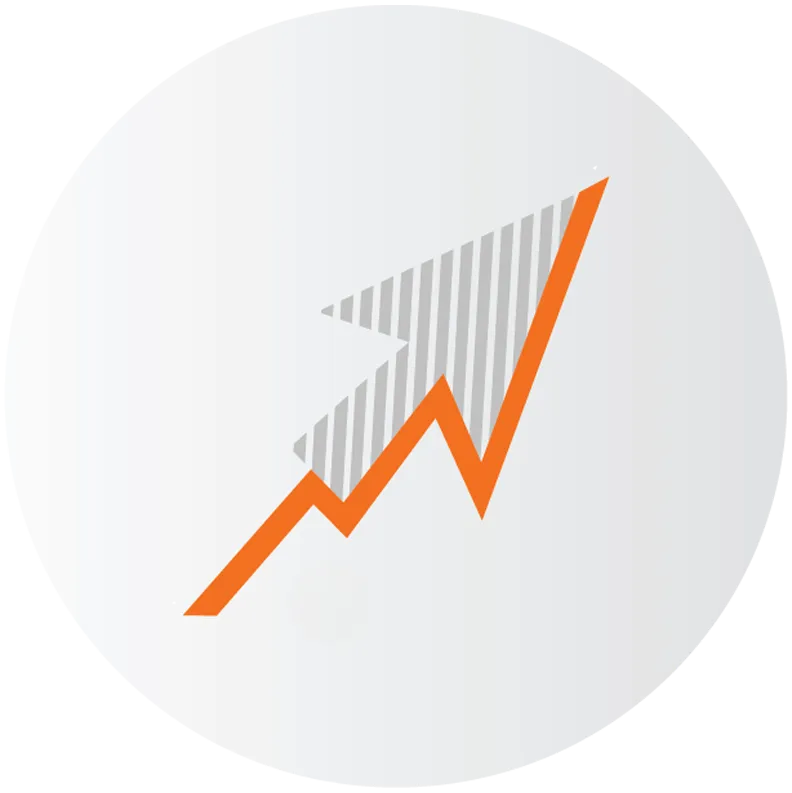
AI Isn’t Taking Your Job, It’s Giving You Your Mind Back
A new report recently claimed that students who use AI are thinking less. That idea made a lot of people nervous, as if artificial intelligence were somehow erasing our ability to think. But let’s pause for a moment. Less than what? Because if we are being honest, our systems have not exactly been temples of original thought. For decades, we have taught students to memorize, to follow instructions, to cite sources, and to play by the rules. We have trained them to think inside the box, not outside it.
That education story isn’t really about students at all. It’s about us. It’s about the way our world has rewarded compliance and repetition over creativity and innovation. The truth is, artificial intelligence is not making people think less. It is freeing us to think more. AI is not here to take your job. It is here to take the parts of your job that stop you from thinking.
Before we dive in, this topic is also discussed in the AI Made Simple podcast. Watch it on YouTube for a deeper conversation about how AI is reshaping the way we think, work, and create.
The Real Job Killer Isn’t AI, It’s Mental Overload
Let’s face it. Work, for most people, has become an endless stream of tasks that numb the brain. We spend our days replying to emails, formatting reports, scheduling meetings, and completing forms. The average professional spends more time maintaining systems than creating results. Our calendars are full, but our minds are empty.
That is the real threat to critical thinking—not AI, but exhaustion. When your attention is buried under repetitive work, your creativity shuts down. When your mental energy is spent on details that software could handle, your strategic thinking fades away.
AI steps into this picture like a lifeline. It can handle the tasks that weigh us down. It organizes, sorts, summarizes, and automates the repetitive details that consume our time. Instead of replacing us, AI gives us the breathing room to do what only humans can do: ask questions, imagine solutions, and connect ideas in ways machines never could.
Why We Confuse Activity With Intelligence
For years, we have been trained to equate busyness with productivity. The longer the hours, the harder we believe we are working. But activity is not the same as intelligence. Answering hundreds of emails might look productive, yet none of those messages may actually move your business forward.
AI forces us to confront that illusion. It reveals how much of what we call “work” is really maintenance. Machines excel at that kind of busywork. Humans do not. When AI takes that load, it allows us to focus on the work that matters… the kind that requires perspective, judgment, and creativity.
That is the quiet revolution happening right now. AI is not removing jobs; it is rewriting them. It is separating the tasks that require humans from the ones that don’t. And if that sounds threatening, consider what happened with every major tool in history.
A Lesson from the Tools That Came Before
When calculators appeared, teachers warned they would make students forget math. When spreadsheets came along, accountants were accused of becoming lazy. When search engines arrived, people feared curiosity would die. None of that happened. Instead, those tools expanded what humans were capable of doing.
Calculators freed mathematicians to explore complex theories. Spreadsheets unleashed financial modeling and forecasting. Search engines turned the entire world into a library.
AI is simply the next chapter in that story. It is the tool that handles the cognitive grunt work so we can focus on insight and imagination. It doesn’t dull our thinking. It clears the fog around it.
The True Partnership Between Human and Machine
Machines are brilliant with details. They see patterns, process data, and execute tasks with speed and precision. But meaning, intuition, and creativity remain distinctly human. AI handles the volume; we handle the vision.
The future belongs to people who know how to merge the two. Imagine a marketer who uses AI to analyze trends in seconds, then spends the rest of the day crafting ideas that connect emotionally with customers. Or a CEO who relies on AI to handle the endless logistics, freeing her to focus on culture, innovation, and purpose.
This is not the end of human work. It is the return of meaningful human work.
The Education Example That Started It All
That study about students “thinking less” with AI is actually proof of something hopeful. When students use AI to summarize sources or generate outlines, they are not disengaging. They are offloading the tedious parts of learning so they can think about the ideas that matter.
The same applies to professionals everywhere. Using AI to draft, research, or automate does not make you less capable. It makes you more focused on what matters. Instead of proving you can grind through a process, you can prove you understand the purpose behind it.
That is the difference between compliance and creativity. AI rewards those who know how to think, not those who only know how to follow.
A New Definition of Productivity
We are at a turning point. The old definition of productivity—how many hours you worked, how many emails you sent, how many boxes you checked—no longer defines success. AI is exposing that myth.
In this new world, productivity is measured by insight, by originality, and by the ability to turn information into innovation. Machines will handle the rest. And that is not something to fear. It is something to celebrate.
Think about it this way: AI doesn’t take your mind. It gives it back. It removes the endless noise that blocks your best ideas. It creates mental space for curiosity, creativity, and critical thinking. It brings us back to what makes work fulfilling—the human ability to imagine something better.
The Bottom Line
The narrative that “AI is coming for your job” is not just wrong—it is lazy thinking. AI is coming for the parts of your job that crush your mind, not the parts that use it. It will take away the repetition, the routine, and the red tape, but it will never take away your ideas, your insight, or your imagination.
The future of work will belong to those who know how to think with machines, not against them. AI is not the end of intelligence. It is the beginning of getting it back.
So instead of fearing AI, embrace it. Let it handle the grind so you can focus on growth. Let it free your time, your focus, and your creativity. AI is not taking your job. It is giving you back the most valuable thing you ever had—your mind.


